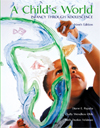 |  A Child's World: Infancy through Adolescence, 9/e Diane E. Papalia,
University of Wisconsin-Madison
Sally Wendkos Olds
Ruth Duskin Feldman
Cognitive Development during the First Three Years
Chapter Outline
Section I Studying Cognitive Development: Classic Approaches
Behaviorist Approach: Basic Mechanics of LearningClassical and Operant ConditioningInfant Memory
Psychometric Approach: Developmental and Intelligence TestingTesting Infants and ToddlersSocioeconomic Status, Parenting Practices, and IQAssessing the Impact of the Home EnvironmentEarly Intervention
Piagetian Approach: The Sensorimotor StageSensorimotor StageDevelopment of Knowledge about Objects and SpaceWhat Abilities May Develop Earlier than Piaget Thought |
 |  |  | Section II Studying Cognitive Development: Newer Approaches
Information-Processing Approach: Perceptions and RepresentationsHabituationEarly Perceptual and Processing AbilitiesInformation Processing as a Predictor of IntelligenceViolation of Expectations and the Development of Thought
Cognitive Neuroscience Approach: The Brain's Cognitive Structures
Social-Contextual Approach: Learning from Interactions with Caregivers |
 |  |  | Section III Language Development
Sequence of Early Language DevelopmentEarly VocalizationRecognizing Language SoundsGesturesFirst WordsFirst Sentences
Characteristics of Early Speech
Classic Theories of Language Acquisition: The Nature-Nurture Debate
Influences on Language DevelopmentMaturation of the BrainSocial InteractionChild-Directed Speech
Preparing for Literacy: The Benefits of Reading Aloud |
|



 2002 McGraw-Hill Higher Education
2002 McGraw-Hill Higher Education